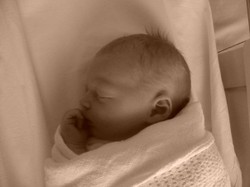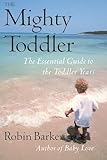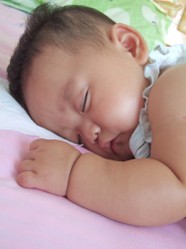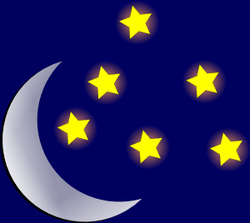Irritability, crying, fist biting, loss of appetite, nappy or diaper rash, fevers--heck, just about anything seems to be attributed to teething these days. The experience of teething is still a remarkably popular topic among mothers with young children, and many whom I have encountered will swear up and down that teething is very real and very confounding. Despite logic and science touting that "teething causes nothing more than teeth," the myth perpetuates.

Is Teething Real?
Rashes, fevers, diarrhea, sleeplessness and a host of other ailments have all been attributed to teething in healthy babies. Is teething really the culprit?
My Own Experience With Teething
It wasn't until I was brave enough to venture out to a mother's group when my first child was 14 weeks old that the idea of teething was even introduced to me. Perhaps it was because I had my children overseas, away from older family members who might still carry the whole teething theory with them, that I never considered attributing teething to any physical problem my babies were experiencing. Once I was around other mothers, they began to tell stories of nappy rashes when their baby was teething, diarrhea and new teeth, fevers and teeth. I felt like I was missing something, because it simply didn't make any sense to me.
Even on occasions when my own children had fevers, rashes or unexplained irritability, no health professional I visited even hinted at teething. They assessed the level of fever, they checked the rash and we discussed the possibility of new lotions or detergents that could have caused a reaction, and nappy rash was just, well, nappy rash. Yet the other mothers I found myself around were adamant about the horrors of teething, that their baby was up all night because of teeth, that their baby has diarrhea because of teeth. Not just new mothers, but older people I encountered in shops as well: if my baby fussed for a moment, a well-meaning grandmother type would often lament, "Oh poor thing, must be teeth coming through."
None of these things was ever part of my experience raising and caring for two infants. I never noticed a particularly runny nappy the day before a new tooth. I never linked a rash or rosy cheeks to teeth pushing through. In fact, I found myself unable to pass off conditions that I felt were quite serious, namely fevers, as "just teething." Many serious illnesses have symptoms like fevers, rashes, diarrhea and irritability: what if my baby had something serious and I just ignored it? Am I some groundbreaking baby scientist? Far from it. It just never added up to me.
The History of Teething
Like an old wives tale, the idea of teething causing illness stretches back many generations.
According to Robin Barker, former midwife, child health nurse and author of bestsellers Baby Love and The Mighty Toddler, attributing teething to the myriad of inexplicable reasons babies fuss or cry dates back centuries. Barker cites cases of scurvy in the 1880's, of which swollen gums were a symptom, but which was attributed to teething. She explains in The Mighty Toddler that, "gums were often lanced to 'get the teeth through' and so, it was thought, improve the babies health. 'Teething' (or dentition) was frequently given as a cause of death on death certificates when in fact babies were dying of scurvy, diphtheria, measles, scarlet fever and so on." To most of us today, teething as a cause of death sounds rather outrageous--how ill-informed people were in the past! But have we really come much further?
Barker also cites how older children don't seem to exhibit issues surrounding adult teeth coming through. She explains that, other than the excitement of the tooth fairy, adult teeth appear to cause no disruption in children. Could emerging teeth cause discomfort in infants? It's possible, says Barker, but we likely will never know because infants can't talk.
Get Your Own Copy of "Baby Love" Now!
 | Baby Love: 6th Edn |
 | BABY LOVE New Edition V 1.1 |
 | Baby Love: Everything You Need to Know about Your New Baby |
What Does Science Say About Teething?
Studies regarding teething have been done in recent years. The results may surprise you.
According to www.abc.net.au, "some 18 surveys covering Australia, Africa, Asia and the Americas found an almost-universal belief less serious symptoms were irritability, sleep disturbance, drooling, red cheeks, fever, nappy rash, 'sooking', infections, pulling at ears, runny nose and smelly urine (which is actually quite serious)."
One study conducted by Dr Michael Macknin at the Cleveland Clinic Foundation in Ohio in 2000 followed 125 parents and asked them to record their child's behaviour over an extended period of time. Dr. Machnin's final analysis, "found there was no link between teething and more serious symptoms such as stool looseness, stool frequency, sleep disturbance, decreased appetite for liquids, cough, rashes other than facial rashes, or vomiting. There was also no link with a major rise in temperature, or with major illnesses. He concluded that there was 'no evidence that teething was associated with any severe, health-threatening conditions'."
Another study conducted by The Royal Children's Hospital Melbourne in Melbourne, Australia found similar results in that "tooth eruption does not actually cause the common symptoms reported by parents and childcare workers. It suggested that young children do drool, get grumpy, sleep poorly etc - but that these aren't actually related to teething. Older infants and toddlers experience frequent minor illness and rapid developmental change, including the emergence of teeth. It appears these symptoms may just be more common at these ages, coinciding with the age at which teeth erupt." The recommendations went on to warn parents and caregivers that:
"Firstly, if your child is having problems such as sleeping poorly, don't just put it down to teething - get some help for the sleep. Secondly, some symptoms commonly attributed to teething (eg fever and infection) should always be checked by a health professional - they may need treatment quickly, and should never be put down to teething."
For the most part, studies are showing that teething does not cause the range of rather serious complications that many people believe. The further warning to take conditions such as fever, rashes, changes in urine or bowel movements and changes in appetite as symptoms of possibly serious illness is nothing to ignore.
You might also like
Save Our Sleep by Tizzie Hall: The New Parent's BibleExhausted? Sleep deprived? Confused? Tizzie Hall's book, "Save Our Sleep" ...
Getting Your Baby to Sleep - What Worked for UsAre you having trouble getting your baby to sleep? Awful isn't it. Here's wha...
Planning Babies First BirthdayRead a step by step guide to planning your babies first birthday party writte...






 Raoul Wallenberg: Lost Hero of The Holocauston 02/08/2013
Raoul Wallenberg: Lost Hero of The Holocauston 02/08/2013
 Health Benefits of Knitting and Crocheton 02/17/2013
Health Benefits of Knitting and Crocheton 02/17/2013
 White Chocolate Hello Dollies--A Classic Dessert With a Modern Twiston 02/20/2013
White Chocolate Hello Dollies--A Classic Dessert With a Modern Twiston 02/20/2013
 How To Survive A Canadian Winter When You're Australianon 02/16/2013
How To Survive A Canadian Winter When You're Australianon 02/16/2013




Comments
Hi Robin, and thanks for your comment! Even though my kids are older now, I still follow these ideas on teething. Interesting too, now that they are losing their baby teeth, there doesn't seem to be ANY pain or discomfort associated with adult teeth coming in--and they are old enough and capable enough to tell me exactly how they feel! To new moms I encounter, I often share these ideas about teething, and they still look at me like I'm crazy. I don't get it either! Thanks again for your comments and for all the work you've done and still do to help parents navigate those early years!
Wow, just stumbled across this. Thankyou so much.
I have been arguing this for a few decades and in the process have been (not to put too fine a point on it) vilified, misinterpreted, scorned and otherwise given the thumbs down on my teething theories - based on years of wide-ranging clinical experience rather than 'what happened to my baby'.
Whenever I do an interview it invariably comes up and I have to justify my position all over again.
I find it extraordinary that 'teething' (a normal process, not a disease) takes up so much time and breast-beating. By the time kids are 3+ no one pays it any attention.
What is it about this issue that gets mothers so worked up and convinced I am trying to put them down?
Weird.
Anyway BrookeVanBeek, as one of the few people who unequivocally concede I have a point, thankyou.
Thanks Bobski! I realize many people are convinced about medical problems related to teething, which is why I thought the actual studies were compelling, especially the advice to never ignore serious conditions as just "teething!" Glad you got something out of the article!
My baby sister is just starting to teeth and apart from being a little groggy when the tooth is pushing through she's not having any of these other so called horrors of teething. This was a really interesting read though, thanks :-)